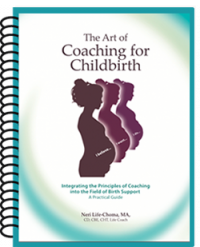
The #MeToo Movement, Birth Activism, and the Future of Childbirth Support
Those who follow my blog and webinars know that I often question and challenge the current approaches accepted by many birth support figures. For example, I have been continuously stating in blog posts and webinars that contrary to the accepted notion,evidence-based studies do not empower women to own their childbirth experience because women base their decisions on a set of predetermined beliefs rather than the evidence. (If this idea sounds familiar to you, it’s only because you recognize it from the introduction to Henci Goer’s book “The Thinking-Woman Guide for a Better Birth”, in which she applies this decision-making process to OBGYNs). I also repeatedly urge birth support professionals to avoid the term ‘Natural Birth’, along with the idealization of the un-medicated childbirth over the choice to receive medical assistance for coping with labor. Perhaps this can explain my fascination with the debate among feminists around the #MeToo movement, and the tension around its possible outcomes.
The #MeToo movement is about freedom of choice and self-worthiness; surely, it relates to childbirth!
The tension I recognize between childbirth support and birth activism is what makes the #MeToo movement relevant to our field. As the campaign was spreading frantically, we witnessed women standing by one another, associating themselves as a force that will no longer be quiet about sexism and misogyny. There is more than the scream for no more sexual harassment in the #MeToo arousal- women have had enough! Women are done being quiet and they want their voices to be heard. The movement is definitely also about freedom of choice and self-worthiness. While there were many empowering voices, there were some active feminist voices that disagree with the movement and its message. Since I always considered birth activism to be a niche of feminism, I followed the debate which led me to some new understanding about the field of childbirth support.
Collective liberation vs. individualist one that strives for individual empowerment.
The split among women in regards to the #MeToo movement is between two polarized approaches in feminism – Socialist feminism and Individualist feminism. The socialist approach recognizes that women are oppressed, and attributes the oppression to capitalism. Thus they insist that the only way to end the oppression of women is to overthrow the system. On the other hand, the individualist approach states that in order to lead the feminist project of releasing women from the oppression, we need to empower women as individuals. In other words, the two paradigms are the social one, that strives for a collective liberation vs. the individualist one, that strives for individual empowerment. According to the individual empowerment approach, the social one weakens women by sending the message that they need protection from the system and can’t stand up for themselves.
Coming back to the field of childbirth support, we can see how some birth activists are geared toward a collective liberation and focus on changing the system – such as the Improving Birth Coalition or CMQCC, or the informed decision approach represented by Henci Goer’s book mentioned above, whereas other approaches like Birthing from Within, Active Birth, and Coaching for Childbirth focus on empowering the individual to find her voice and her inner strength to actualize the birth she desires. Throughout decades of birth activism, we have witnessed the two approaches – we had birth activists who focus on providing knowledge and tool to birthing mothers, and those who were fighting the medical system for abusing the traditional pathways to childbirth and birthing mothers.
Some birth activists focus on collective liberation and changing the system, others emphasize personal empowerment
What’s between personal empowerment and collective liberation in childbirth support?
We need to be clear on the role we play in order not to evoke a new type of #MeToo campaign, in which birthing mothers who might have felt that they were pushed to breastfeed or judged for their birth choices, will stand up for themselves and the value of their choices. We need to be careful not to impose any agenda on women or be judgemental about their birth choices. As a birth-keeper and activist, one can idealize the un-medicated birth as well as fight the authoritative, and sometimes aggressive, maternal care provided by hospitals. However, in our birth support practice, we need to promote no agenda. Doing so might stimulate more fear instead of us being a resource of empowerment for women. When I support a client towards her desired birth, I lead the expectant individual through a self-discovery process with the goal of allowing her access to her beliefs, wishes and strengths around her nearing birth. If my client chooses a hospital-based birth, I avoid expressing my criticism of hospital-based maternal care when I coach her, because this can easily instill fear and insecurity.
I lead the expectant individual through a self-discovery process with the goal of allowing her access to her beliefs, wishes and strengths around her nearing birth
Practicing birth support from a social liberation position, you might act in the following ways:
- Decide to support only expectant mothers who desire to have a natural childbirth or even a home birth, or in general – serve only clients who are aligned with your birth activist philosophy.
- Express your disagreement with your clients’ care-provider, and what you think should be done in the situation.
- Provide couples with studies that contradict the information they were provided by their caregiver.
- Offer to join couples for the next visit to the clinic, and facilitate the dispute or confrontation with the back-up of the new evidence.
- Encourage couples to switch to a new OB practice, which you know to be more supportive of your philosophy of care.
- Express your lack of trust in the medical system as a whole in light of this new and better evidence which you just provided, telling them that their desired experience won’t be respected by the system.
- Speak-up and advocate for your clients in L&D and protect them from the system.
Practicing birth support from an individual empowerment stand, you will see this as an opportunity for your clients to find their voice and advocate for themselves. Respecting your clients’ choice of a hospital-based birth, you will conduct an inquiry and a facilitate self- discovery as follows:
- What do you feel about your caregiver’s advice?
- Did you fully understand the goals and the procedure, or do you need more information?
- Would you like to follow this advice or search for other options?
- Would you like me to provide you with more resources?
- How can I best support you right now?
After the client read more resources or when you are already in L&D, you may ask:
- How do you feel about it now? (be open and supportive to all the options)
- How would you like to proceed?
- Would it help you if we practice your discussion with the OB? We can practice role-playing.
- How can I best support you right now?
- Do you feel confident about making this decision, or do you need additional support?
- Are you ready to call the nurse/OB back to the room and express your needs and decision?
The Coaching for Childbirth approach provides birth support professionals with all the questions, strategies and tools they need in order to conduct the inquiry and lead expectant mothers in a self-discovery process. It helps women find their inner truth and beliefs, and carve their birth experiences in accordance. While some studies can provide evidence in support of epidural, induction, or any other medical procedure, and other studies can provide evidence against those interventions, a respectful and sensitive coaching process can reveal the inner truth of your client, which counts the most.
Additional Resources about birth activism and women’s right of choice:
- https://rewire.news/article/2018/12/13/the-movement-for-human-rights-in-childbirth-is-not-a-natural-birth-movement/
- https://halshs.archives-ouvertes.fr/halshs-00702075/document
- https://journals.sagepub.com/doi/abs/10.1177/1464700105057363
- https://www.tandfonline.com/doi/abs/10.5172/hesr.2006.15.4.364
- Overshadowing the Transformative Essence of Childbirth with Data - July 10, 2024
- Navigating the Epidural Dilemma - May 28, 2024
- Informed Decision in Birth Support: A Myth of Empowerment? - April 29, 2024


